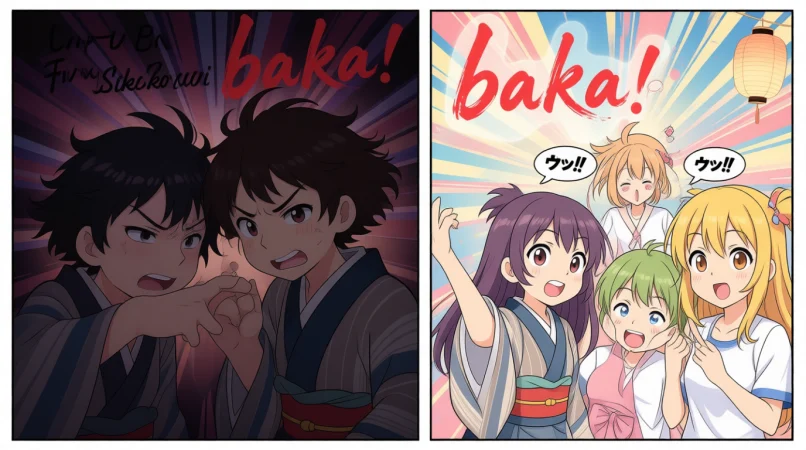Baka is a Japanese word that literally means “idiot” or “fool.” Depending on tone, context, and culture, it can be playful, teasing, angry, or even cute. For example, “sussy baka” combines “suspicious” with “baka” and is a popular meme online.
If you’ve spent any time watching anime, scrolling through TikTok, or chatting in online games, you’ve probably encountered the word baka. People often wonder, “what does baka mean,” “does baka mean idiot,” or “what does sussy baka mean.” In short, it’s a playful insult that can range from teasing a friend to expressing frustration in a humorous way.
While “baka” literally means “fool” in Japanese, its meaning evolves depending on how it’s used. Anime fans hear it in dramatic, comedic, or flustered contexts, while gamers and social media users have adopted it in memes like “oi oi oi baka” or playful roasts.
Understanding how to use and respond to it correctly is important if you want to avoid misunderstandings or just join in on the fun.
Definition & Meaning

At its core, baka translates to “idiot,” “fool,” or “silly person.” In English, it’s the equivalent of calling someone a dummy, goof, or silly person.
For example:
- Angry:
A: “You left the game unfinished!”
B: “Sorry!”
A: “Baka!” - Playful/Flirty (Anime style):
A: “I made you lunch.”
B: “I-I didn’t need it… baka!” - Internet meme/Gaming:
“Bro walked straight into the trap. Sussy baka.”
People often ask variations like “what does baka mean in English,” “what does baka mean in Japanese anime,” or “what does baka mean in slang.” No matter the phrasing, it’s all about calling someone foolish—sometimes lightly, sometimes seriously.
Background & History

The term baka has been part of Japanese language for centuries, appearing in classical literature and Buddhist texts. Originally, it referred to someone unwise, unreasonable, or ignorant. Over time, it became the casual word for calling someone a fool or idiot.
Anime helped popularize baka worldwide. Characters, especially tsunderes, often shout it when flustered or embarrassed, creating a dramatic or comedic effect. With the rise of the internet, the word spread to social media, memes, and gaming communities, giving birth to new phrases like sussy baka, a humorous fusion of “suspicious” and “baka.”
Even in Spanish or Chinese-speaking online communities, baka is borrowed directly from Japanese and retains the meaning of “fool” or “idiot.”
Usage in Various Contexts

Texting & Casual Chat
- Teasing a friend: “You ate my fries! Baka 😡😂”
- Light-hearted mistakes: “Forgot my homework again? Baka!”
Social Media
- Memes: “oi oi oi baka” trending in anime edits
- TikTok: cute, dramatic reactions or roasts
- Twitter/X: anime-themed posts and jokes
Gaming
- Playful insults: “Why’d you jump into the lava alone? Sussy baka.”
- Roasting teammates in multiplayer games
Anime & Flirty Situations
- Dramatic or playful yelling: “I can’t believe you did that… baka!”
- Tsundere teasing in romance: “W-Whatever… you’re the baka!”
Common Misconceptions & Clarifications

- Baka is always offensive: Not true. Tone and context matter.
- Baka means cow: False; different kanji.
- Sussy baka is Japanese: Nope, it’s a meme combining English slang with Japanese.
- Only anime fans use it: No, it’s widespread in gaming, social media, and meme culture.
Similar Words & Alternatives
| Word | Tone | Notes |
|---|---|---|
| Aho | Harsher | Kansai region slang |
| Dummy | Playful | English alternative |
| Fool | Neutral | Everyday English |
| Goof | Friendly | Meme-friendly |
| Sussy Baka | Meme | Suspicious fool, humorous |
How to Respond
- Casual/Friendly: “Lol okay, I messed up 😅”
- Cute/Flirty (anime-style): “H-Hey! I’m not a baka… you are!”
- Humorous: “Certified sussy baka reporting for duty”
- Professional: “I assume this was a joke. Please keep the tone respectful.”
- Silent/Privacy-conscious: Ignore and move on
Regional & Cultural Differences

- Japan: Can be offensive depending on tone.
- West: Often cute, playful, or humorous.
- Anime fans: Dramatic or flustered usage.
- Spanish & Chinese online communities: Borrowed from Japanese, not native.
Comparison with Similar Terms
| Word | Harsh Level | Cute Usage | Anime Use | Meaning |
|---|---|---|---|---|
| Baka | Medium | Yes | Very common | Fool/idiot |
| Aho | High | Rare | Kansai dialect | Dumb/idiot |
| Dummy | Low | Yes | English | Silly person |
| Sussy Baka | Meme | Yes | Viral | Suspicious fool |
Usage in Online Communities & Dating Apps

- Tinder/Bumble/Hinge: Playful flirting among anime fans.
- Discord/Gaming: Roasts, banter, or cute teasing.
- Twitter/X: Anime edits, memes, dramatic reactions.
Hidden or Offensive Meanings

In Japan, shouting baka can be a strong insult.
Outside Japan, it’s mostly harmless humor.
Context and tone are key—reading it incorrectly could lead to misunderstandings.
Professional Suitability
- Not suitable for emails, work chats, or formal communication.
- Use alternatives like:
- “That was a mistake, please correct it.”
- “Let’s try to be careful next time.”
FAQs
1. Does baka mean idiot? Yes.
2. What does baka mean in Japanese anime? Fool/silly person, often dramatic.
3. What does sussy baka mean? Meme: suspicious fool.
4. Is baka a bad word? It can be rude depending on tone.
5. What does baka mean in Spanish? Borrowed from Japanese: idiot/fool.
6. What does baka baka mean? Repeated for emphasis: “idiot idiot.”
7. What does oi oi oi baka mean? Dramatic anime-style scolding phrase.
Conclusion
“Baka” is more than just a word. It’s a cultural, emotional, and humorous expression that changes meaning based on tone, context, and culture.
From anime to social media, gaming, and memes, knowing what baka means helps you understand jokes, flirts, and playful insults.
If someone calls you a baka, or you encounter sussy baka online, you now know how to interpret, respond, and even join the fun—without being misunderstood.




